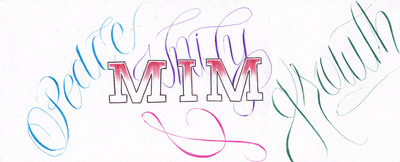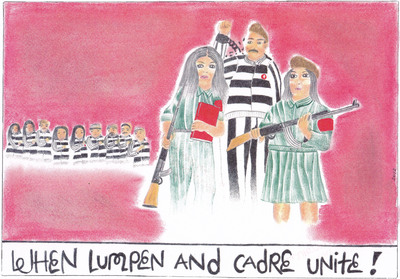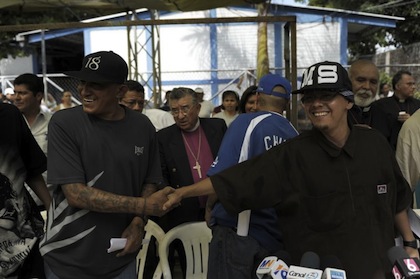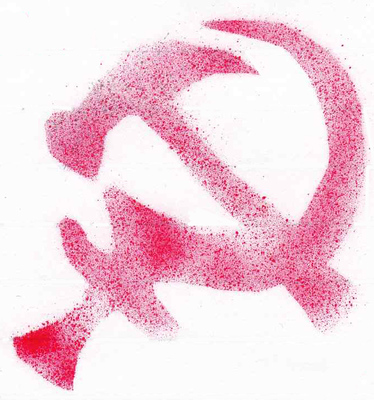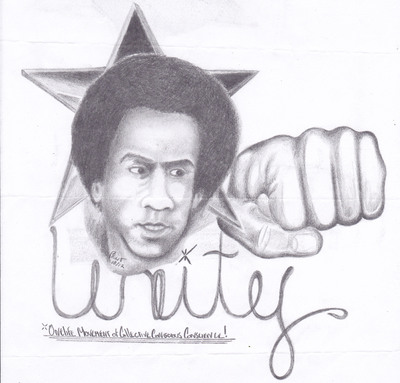
Building Healthier Revolutionary Lives in Prison
Amongst the four goals put forward in ULK issue 31 was the humyn needs such as healthy food and water along with fresh air and exercise. To some these things are assumed to be met, many especially out in society would be shocked to learn that in fact these things are not met for many in U.$. prisons. Indeed ULK is one of the few prisoners rights publications which not just highlights these oppressive conditions in U.$. prisons, but which also keeps perhaps the largest archive on prisoner’s rights violations, particularly on censorship of U.$. prisons. This dedication to prisoners, those cast off of U.$. imperialism, is what first brought me to work with ULK and USW. This is what stood out to me when I would open up a MIM Theory or MIM Notes and see Amerika called out in such bold fashion. This drew me to learn more, especially when a lot of the substance of their articles were prison-based, a section of society that even many so called “progressive” peoples have abandoned.
As prisoners, healthy food is out of our reach for the most part. The truth is if we were to eat everything on these trays we would still not consume the essential vitamins and nutrients needed to call our meals healthy. Most of this slop would make a raccoon’s stomach turn and could not be sold to the public, so it finds its way to the dungeons. A review of your past issues of ULK would show that prisons across the United $tates have slop. This is no surprise but what needs to be developed is how can we acquire the healthiest food under our circumstances. We got to do what we can with what we have as there is a connection between the body and mind. How can we be good revolutionaries if we are sick, have no energy or have diseases because of foul eating habits? This would hinder our ability to exist as people, much less as revolutionary people, which demands more energy, more focus, and more strength.
Those who are financially able to purchase food items from the canteen or from packages (once a year here in SHU) have a choice of mostly junk food i.e., food that is saturated in sodium, transfats and unnatural chemicals which work as artery cloggers. These junk foods are unhealthy, so how can we be revolutionaries but spend all our money on candy and chips? This is akin to considering yourself a revolutionary but being a dope fiend at the same time, or being a revolutionary but an alcoholic. This applies to comrades out in society as well. Indeed, studies have recently found that in the lab, mice have become addicted to fast food and that this addiction was stronger than being addicted to crack. In prison being addicted to junk food is destroying your body and this destruction is serving the imperialists not the people, because with a revolutionary out of commission, inflicted with high blood pressure, heart disease, etc., it is one less revolutionary on the front line.
Now if we look at this from an economic perspective, by us purchasing all the junk food we are basically lining the enemy’s pockets with the few dollars our families or comrades have been able to send us. We are basically providing financial support to the terrorists=U.$. capitalists. We are funding them and supporting their business. If we are to truly empathize with the oppressed of the world and analyze the world from a Third World perspective, how can we do so by being consumed with corporate products? By us living in a capitalist society we are already forced to utilize corporations for everything we do. Even in prison we are forced to use electricity owned by corporations, consume and use hygiene products from corporations, even the paper I use and envelopes I purchase are not exempt. But these are items we must purchase for our work, we do not however have to purchase chips and candy, just as the comrade out in society does not have to purchase that big mac or french fries all the time. Of course we are not robots and as humyn beings it is ok to celebrate and indulge in something you like once in a while, but this is different than always chasing these items and living an unhealthy lifestyle.
If we are attempting to set an example to others this should also include our eating habits. So how can we revolutionize our food while in prison? Some will incorrectly think we can do nothing because the ‘all powerful’ state we live under controls this, but we need to toss out this self-defeatist thinking and learn from Mao when he said the imperialists are paper tigers. As with all battles with the state we just need to find the contradiction and focus our efforts therein.
As far as our trays we really only have two paths, one is the appeal process, like finding a violation or lack of calories, and two is how we have included this in our demands in the strike here in Cali. But in the realm of canteen or package items there is much more potential as nothing hurts the capitalists more than the economic pinch. What happens when nobody buys that certain toothpaste or soap for months? It is usually replaced with a different brand. And why have some items such as Folgers coffee been on the canteen list for decades? Because this is bought by many, so there is a market for this. Why then can’t we replace or have them replace all the candy and chips with healthy foods? We can and I will tell you how with an example from a recent struggle.
Most recently we had an issue here in SHU where we wanted access to purchase a combination TV/Radio since we are only allowed 1 appliance, we wanted to receive a TV with a radio combo. The prison said no. This was included in our demands during the strikes of 2011 as well, the prison finally broke it down saying we could get the TV/radio combo, but that the manufacturer has to make a clear model. Time passed and nothing. The manufacturer finally made one clear but with a speaker so the prison said they must make it without a speaker. We waited and nothing. The prison blamed the company and the company said nobody from the prison contacted them so we got creative and persistent. The short corridor collective issued a statement to prisoners in California calling for everyone to write the company demanding a TV/Radio combo should be made available to us or we will boycott their company. Friends and family on the outside were told to call and e-mail the company doing the same. With the thousands of prisoners in Cali who keep this business afloat the pressure was too much, and within 60 days the company provided the TV/radio which we can now order for the first time in the 20+ years this prison has been open. So this is a way to get vendors to sell us the products we want and has proved to be effective, but it must be done by all prisoners in a state as we did it here.
Some may wonder how can all prisoners in a state know about a project like this. This is the importance of prisoners to subscribe to prisoners’ rights publications which address issues. If prisoners in all prisons in a state subscribe to certain publications then when issues arise the people won’t be in the dark. ULK is one such publication, write to ULK for a subscription, communicate and let your voice be heard!
If we don’t buy junk food and we write companies to demand they start selling us more healthy goods that are more in line with our culture, once the companies know that they may be boycotted they will break it down as they did with our TV/radio combo.
Certain diets also provide healthier non-processed food like the halal kosher or veggie diets. Those rare times when I get a few bucks and go to canteen I buy the most healthy products. We will never have the ideal healthiest products in prisons under capitalism but the best we can do is with dry goods such as dehydrated rice and beans. I also will get the saltine crackers since this prison forbids us from having salt, which our bodies rely on, and the crackers at least give a small bit of salt. I try to get the dry oatmeal as well for fiber and iron. The beans give me protein which the mystery meat does not give. Some prison canteens allow people to purchase beef jerky which is good as well, all this allows us to supplement the shitty prison food with reasonably healthy food. Packages for those who are able provide items such as power bars, granola, nuts and beef jerky, wheat crackers, and for those on the mainline more opportunities exist like peanut butter, dried fish, mushrooms, spices, honey and salami, cheese etc. We must see that our eating habits are tools, they are weapons in our battle to be the best revolutionaries possible. While under lock and key, our health should be seen as our first line of defense! This is because with piss poor health how can we advance the revolution? How can we advance our nation if we are bed-ridden or all drugged up on meds for diseases? It slows us down in our work.
I used to listen to the rap group ‘Dead Prez’ talk about eating healthy and the need to be healthy. They had it right because there is a connection between our health and our mind, one affects the other and if one is off the other will follow suit.
But not everyone has the ability to buy canteen items or get packages, some folks are broke and have no outside support so what is to be done? One way to get around this is to cultivate a support system. Comrades here have developed a ‘peoples support system’ (PSS). This PSS ensures that anyone in the pod who goes to canteen or receives a package distributes these goods to everyone who has not received a package or canteen. In this way no one goes without. This process of building a PSS is easier when prisoners involved are conscious or at least have been doing time for a long time, and is more challenging when those involved are new to prison or suffer form extreme forms of parasitism. But even then it can be developed with time and the use of modeling behavior.
Modeling behavior occurs when someone sees a behavior and then mirrors this same action. For example, a child who sees their parent pick up the toys and throw them in the toy box, the child eventually picks up the toys herself and tosses them in the toy box without ever having been told to do so. In this same way when someone enters a pod or block and sees prisoners looking out for each other regardless of ones nationality or LO the new person will soon begin mirroring this behavior, so it is up to us conscious prisoners to set the tone on a tier, pod, block or yard. This is revolutionizing our environment, it is putting theory into practice.
Don’t get it twisted I’m not saying this is always easy. It may take months or years to get someone to take a class approach, and some will never grasp that prisoners as a whole are a class, but this does not mean we will stop what we do. The Brown Berets - Prison Chapter (BB-PC) have come to understand the PSS is needed in every prison in order to cultivate our united front efforts in our battles, and we know this also leads to raising the consciousness of prisoners when coupled with other forms of education and agitation. At times building a PSS will start with one or two people, but as time goes on more and more people will do so and then all the new people will adopt this “tradition” and these are the revolutionary traditions, the kind of revolutionary culture we want to create so that when we get moved or transferred we know we left a foot print that will continue onward.
Healthy water is also essential, I have had many cellies who really did not drink water, but as humyns we need water to exist. We are supposed to drink about 8 cups of water a day to stay healthy, not 8 cups of coffee or koolaid but water. Water helps us flush out our system and maintain healthy kidneys. Water is free to us, and people in the Third World wish they had access to clean water. Many die because of lack of clean water so let us drink this clean water in order to stay healthy so we can help the struggles of Third World peoples. If it was up to the imperialists they would rather deny us clean water, at times some prisoners are denied clean water. Those who have been to Tracy prison in Cali know about the brown water. Likewise in ULK issue 9 we read the article Contaminated Water OK by CDCR. There was arsenic in the water at Kern Valley State Prison and the prisoner reported that “lead levels that are over the EPA’s legal limit” were found in the water. So I’m sure comrades across Amerika can speak about foul ass water in dungeons all over.
Exercise is another aspect that needs to be taken seriously by all revolutionaries, exercise is so important that the state has targeted it and labels it STG activity. They will validate you and send you to solitary confinement for decades for doing push ups with a comrade. This is how much they see exercise as a threat, because it strengthens us as humyn beings and it is a weapon we use to combat the effects of prison life. The state seeks to strip us of any forms of resistance, anything we draw strength from hinders there project of instilling a sense of helplessness in all prisoners so that we go along with their oppression and never dare to resist the oppressor.
As revolutionary prisoners we need to develop methods of exercise to keep our bodies in top shape. This helps us not only physically, but science tells us that there is a connection between our physical health and our mental health. Exercise prevents not only disease but also depression, stress, anxiety and anger. Our world in these dungeons is filled with all this negativity which harms us just like the bullets and batons even though we often cannot see this damage in its physical form but we react to it in negative ways, so exercise helps us keep this stuff in check. These emotions will not go away but exercise helps us better deal with them without them overpowering our lives.
A good exercise regime is from forty five minutes to an hour, this is usually done from four to six days a week. I have found burpies and calisthenics to be the most fulfilling. Our bodies need to sweat in order to flush out the toxins and many times push ups just won’t do it. California prisons no longer have weights so in the holes and SHUs people mostly do burpies. This tradition, which many Cali prisoners are not aware of, came from George Jackson and his comrades who developed exercise regimes utilizing burpies and calisthenics. At the time, in the 60s and 70s, prisoners were not exercising in this way as these were military style exercise regimes. Comrade George was a step ahead in identifying the inter-connection between a strong body and mind. The early 80s saw Chicano prisoners from Northern Cali develop this same exercise regime, and the late 90s saw Chicano prisoners from Southern Cali along with white prisoners soon follow this tradition that started with Black prisoners. This is good that prisoners exercise, it is a positive thing, but now the state is using it against us so we must find ways to combat this.
One way to fight the STG labeling of exercise is for all prisoners to work out together. If all prisoners work out at once it can no longer be seen as STG activity. I believe this is a positive step forward for a united front, however I don’t think the state will thus be prevented from labeling group exercise STG activity, just as all prisoners of all nationalities participate in hunger strikes yet it is still seen as STG activity. But prisoners working out together would also be an unprecedented step forward. Since most group exercise are done in the hole and most holes consist of cages side by side, I can see a future exercise regime consisting of each cage calling out an exercise, regardless of what nation or sub-group one belongs to, and everyone exercising together. In the SHU we can’t see no one, as everyone is in an individual cell. Some people work out and some don’t so this is a little more difficult. If you find yourself in a hole and people are in individual cages, one is free to jump in and participate with those exercising but the ideal is to have everyone participate. This is something to work on and begin discussing, by working out together it does not mean we are one car, it does not mean you’re joining another nation or LO, it’s simply exercise. If we can starve together why not sweat together?
Today’s prisons are no longer like the prisons of our grandfathers, conditions have changed and we must find ways to change with these times. If we are to ever regain things like trailer visits for lifers, weights, parole dates for lifers, and all the rest, we must be more in sync. If we want the ‘end to hostilities’ to really last than we need to do more, we need to implement methods which reinforce such policies as an ‘End to Hostilities’ and group exercise involving all nationalities and subgroups reinforce this.
The transformation of prisons should begin in every dungeon, and those who find themselves in prisons which are not conscious should learn from prisons who have already taken steps toward this transformation. Those prisons which have already taken such steps should constantly find new ways to push our momentum even further.
Campaign info:
California Strike Against Torture in Prisons - 8 July 2013
Related Articles:This article referenced in:








